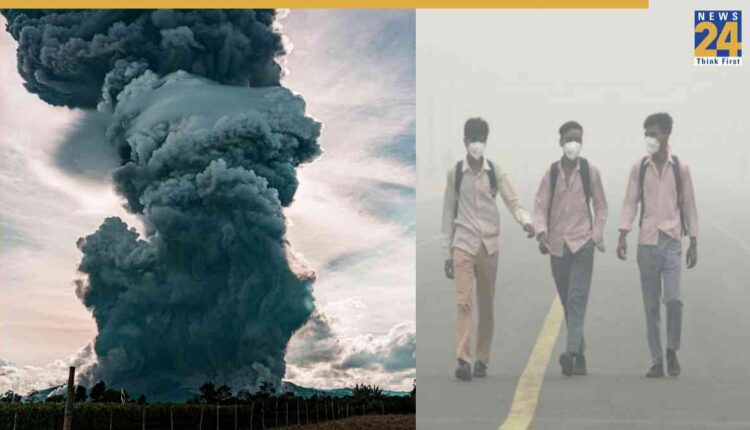Ash cloud from 12000-year dormant Ethiopian volcanic eruption reaches India – will it impact your health? News24 –
Ethiopia Volcano Eruption: Flight operations across India and West Asia were significantly disrupted on Monday night after the long-dormant Hayli Gubbi volcano in northern Ethiopia erupted on Sunday. The volcano erupted for the first time in over 12,000 years. As a result, a massive cloud of volcanic ash, carried by high-altitude winds, was seen drifting over Rajasthan, Gujarat, Maharashtra, Delhi-NCR, and Punjab.
The volcano has sent a massive ash cloud across the Red Sea and towards South Asia. An Abu Dhabi-bound IndiGo flight was among those diverted. In view of the drifting ash clouds, the Directorate General of Civil Aviation (DGCA) has issued a safety advisory to all airlines and regions affected by volcanic ash. Several airlines, including Akasa Air and KLM, also grounded or diverted flights as the ash cloud spread over Oman, Yemen, India, and parts of Pakistan.
Ethiopia Volcanic Eruption Impact On AQI? Are Ash Clouds Dangerous?
However, citizens should not panic in such a situation, as there will be negligible to no impact on AQI levels, reports added. The volcanic eruption is said to impact the S02 level in the hills of Nepal, the Himalayas, and adjoining UP’s Terai belt. The Ash plume mostly consists of Sulphur Dioxide with low to moderate concentrations of Volcanic Ash. According to a meteorological survey, there are low chances of ashfall over plains.
Update06:
The Ash plume mostly consists of Sulphur Dioxide with low to moderate concentrations of Volcanic Ash. Its now stretching from Oman-Arabian sea region into Plains of North & Central India. Its will not impact AQI levels but it will impact So2 level at #Hills of #Nepal,… https://t.co/f95r95mLMi pic.twitter.com/WQOOhKmyHM— IndiaMetSky Weather (@indiametsky) November 24, 2025
Will Volcanic Ash From The Ethiopian Volcanic Eruption Effect Human Health?
Let’s find out what the human and environmental impacts of volcanic ash are. An explosive eruption of volcanic ash can produce an avalanche of rock, ash, and volcanic gases, known as a pyroclastic flow. Plumes of volcanic ash can cover vast stretches of the sky, potentially turning daylight into complete darkness and significantly reducing visibility.
Scientists believe that after the volcanic explosion charges its ash particles with electricity. A volcanic ash cloud is a mixture of particles and gases. In some cases, the ash from a volcanic eruption can pose a threat to people and animals. In humans, it can lead to breathing problems, irritation to the skin & eyes, suffocation, and inflammation. However, there is no such report of a severe impact on citizens’ health in India from the ash produced after the Ethiopian volcanic eruption.
ALSO READ: Ethiopian volcano ash cloud reaches India, crosses Rajasthan, Gujarat and Maharashtra; DGCA issues advisory

